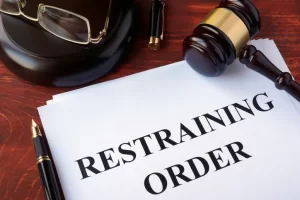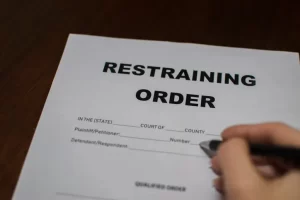a small firm that packs a big punch
- Home
- Attorneys
- Articles
- Practice Areas
- Family Law
- Criminal Defense
- Employment Law
- Personal Injury
- Workers’ Compensation
- Real Estate
- Wills, Trusts & Estates
- Blog
- Courts We Serve
- Contact
- Toggle website search

When an alleged act of domestic violence occurs, there are two separate legal proceedings that may result, one of which is associated with the issuance of a temporary restraining order, while the other arises out of a criminal charge filed against the defendant. The restraining order and the criminal charge typically involve the same incident; however, these cases are adjudicated in two separate venues and the repercussions of each are entirely different. A temporary restraining order is intended to protect a victim of domestic violence from further abuse, while the purpose of a criminal charge is to punish the offender for a crime that already occurred. If you are involved in a domestic violence proceeding as the accused, the outcome can be life-altering, whether it exposes you to criminal penalties, a restraining order, or both. On the other hand, if you are the victim, a restraining order can provide legal protection against further instances of harassment, assault, sexual abuse, stalking, or another form of domestic violence.
If you are involved in any legal issue involving a restraining order, an experienced domestic violence attorney can provide much-needed counsel and aggressive advocacy. The attorneys at The Montanari Law Group, have extensive experience representing parties on both sides of the restraining order process throughout Passaic County, including in Wayne, Clifton, Totowa, and Little Falls. Whether you are the victim or the accused, it is essential to build a strong case and to effectively present these arguments during restraining order proceedings. We will meet one on one with you to gather information about your situation, construct a compelling case, and vigorously advocate on your behalf to achieve your desired outcome. With a background in both criminal and family law, our legal specialists can handle all aspects of your domestic violence case, from criminal defense to the final restraining order hearing. For a free initial consultation, contact our Little Falls offices today at 973-233-4396 or toll-free at 888-877-7985.
A temporary restraining order may arise out of a single incident (i.e. simple assault) or a pattern of behavior (i.e. stalking). The victim may file for a restraining order at their local police department, or if police are called to the scene to respond to a domestic violence incident, the victim or the law enforcement officers may file for a restraining order. Under the New Jersey Prevention of Domestic Violence Act, a judge can issue a temporary restraining order if and when he or she finds the following elements:
A temporary restraining order is just that: temporary. Within 10 days of its issuance, the court must hold a restraining order hearing, after which a judge will decide whether or not to implement a final restraining order. This hearing is a civil court proceeding, held in the Family Division of the County Superior Court. At this hearing, both parties testify, witnesses may be called upon to corroborate statements made by either side or to establish a pattern of behavior, the evidence is presented, exhibits may be entered, and finally, the judge decides whether or not to grant a final restraining order. The judge can implement a final restraining order if and when he or she finds the following elements:
One hopes to be able to count on partners, housemates, and co-parents to be positive influences and presences in their life. Unfortunately, this is not always the case, and some relationships turn sour, often in a violent way. The United States Department of Justice defines domestic violence nationally as any act that is intended to place control over another person within a specific type of relationship. In the case of domestic violence, it is the right of the victim to file a Temporary Restraining Order (TRO) and participate in a hearing shortly thereafter to seek a Final Restraining Order (FRO), which provides long-term protection. Whether a victim meets the requirements to file for a TRO, however, depends on New Jersey-mandated factors. Read on to learn what the grounds are for filing a restraining order in New Jersey.
The attorneys at The Montanari Law Group, LLC have extensive experience handling these complex and delicate matters in a confidential way. We want to give you the peace of mind you need during these troublesome times. If you reside near Clifton, Little Falls, Hawthorne, Haledon, Verona, Nutley and towns around Passaic County, our team is here to help guide you with your restraining order matter.
In order for a person to be eligible to apply for a restraining order in New Jersey, they must show that they are a person protected by the Prevention of Domestic Violence Act of 1991. This act, which outlines nineteen specific forms of domestic violence as criminal offenses, names the type of person that may seek the support of a restraining order in order to resolve a relationship of domestic violence. The relationship between the two people involved must be:
If the plaintiff and defendant fit one of these relational boundaries and all of the following grounds for filing a TRO are met, the person may file a complaint for a restraining order. Read on to learn what the victim must prove to meet the grounds for obtaining a restraining order.
If the plaintiff and defendant meet one of the above relational containers outlined above, the plaintiff must meet the criteria that they were the victim of domestic violence in three specific ways. First, the victim must have been the victim of domestic violence. The Prevention of Domestic Violence Act of 1991 (called simply “the Act”) outlines 19 specific actions that are considered acts of domestic abuse and come with a criminal charge. These are:
 If the person can prove that they have been the victim of one of the above criminal acts of domestic violence, they meet the first element of eligibility for applying for a restraining order.
If the person can prove that they have been the victim of one of the above criminal acts of domestic violence, they meet the first element of eligibility for applying for a restraining order.
Additionally, the person generally must prove that the act of domestic violence was one of the repeated offenses. Can the person prove that the accused displayed a history of abuse in the relationship or household? Only in very serious domestic violence cases is there no requirement to prove that this was a repeated act.
Finally, the victim must show that without a restraining order, they will not be safe. If there is reasonable cause for the victim of domestic violence – which, as noted above, is a repeat or serious offense – to fear for their safety in the absence of legal procedure, a TRO will likely be issued. Within 10 days, a hearing to provide the accused an opportunity to defend themselves will be scheduled, at which point a Final Restraining Order (FRO) may be issued.
Obtaining a restraining order is an essential part of ensuring your safety. Are you or someone you know facing domestic violence, and you need legal help exiting the situation? Don’t delay. Contact an experienced attorney to support you in filing for a Temporary Restraining Order and obtaining the Final Order you need at your upcoming hearing in Family Court. At The Montanari Law Group, we understand the nuances of safely exiting a violent living situation or relationship, and we are experienced in providing swift and confidential support. We serve clients in towns like Wayne, Clifton, Paterson, and across Northern New Jersey in all matters of domestic violence.
A temporary restraining order, also known as a TRO, is a court order designed to protect an individual from an abuser. TROs are not permanent and can be modified, dismissed, or contested by the opposing party at a final hearing.
 In some circumstances, the police are called and respond to a domestic dispute. Upon arrival at the location, the police speak with witnesses, gather information, and make observations concerning the situation. If it appears that the circumstances giving rise to the altercation were the result of a domestic dispute, charges will be filed. In charging the complaint, the police notify the victim of domestic violence that he or she has the right to seek a temporary restraining order. If the victim advises the police that they would like a temporary order of protection, they must speak with an on-call judge, usually at the municipal court level.
In some circumstances, the police are called and respond to a domestic dispute. Upon arrival at the location, the police speak with witnesses, gather information, and make observations concerning the situation. If it appears that the circumstances giving rise to the altercation were the result of a domestic dispute, charges will be filed. In charging the complaint, the police notify the victim of domestic violence that he or she has the right to seek a temporary restraining order. If the victim advises the police that they would like a temporary order of protection, they must speak with an on-call judge, usually at the municipal court level.
The police then assist the victim of domestic violence in seeking the temporary restraining order by informing them of their rights and putting them in contact with the municipal judge. Then, the victim goes before the judge and explains the situation that led to the request for the temporary restraining order. For example, the victim will explain the altercation that immediately preceded the request for the temporary order, as well as the nature of the relationship with the alleged abuser.
The nature of the relationship with the abuser is a requirement for obtaining a temporary order. For instance, domestic violence only occurs between two people that are or were in a dating relationship, family members, married, have a child in common, or household members. Therefore, a friend or neighbor cannot seek a temporary restraining order unless they can prove one of the above factors.
Once the relationship is established and the facts are set forth to the court, the court will decide whether the person appears to be in fear for his or her safety and if a temporary order should be issued.
In many cases, temporary orders are issued because only the victim’s information and rendition of the events was put before the initial judge. The defendant (the person against whom the order is sought) has no right to be present and has no knowledge that the order is being issued. Only after the temporary order is issued will the Defendant be notified and served with the order.
The police take the temporary order signed by the judge and personally serve the defendant with the order and seize all firearms that the Defendant may have. The officer writes down the date, time, and location in which the order was served and forwards the signed order to the Family Division in the county in which the case will be heard.
Once the Defendant is served with the order, he or she must abide by all instructions and restrictions as noted in the order. If a person fails to abide by the no contact provisions of the order or violates the order in any way, he could be charged with an offense of contempt. A charge of contempt, depending on the nature of the contact, can either be a disorderly person’s offense or a fourth-degree criminal offense. It is advisable not to have any contact with the Plaintiff/victim until the date of the final restraining order (FRO), in the presence of the court.
A date for a final restraining order hearing will be noted on the temporary order. That final hearing is a day that both parties go before the court to set forth (Plaintiff) the allegations or contest (defendant) the allegations that led to the temporary restraining order. Both parties will be able to testify, present evidence, and set forth facts in pursuit or opposition to a final order.
It is important to understand the legal aspect of obtaining or contesting a restraining order and to have an attorney representing you with experience handling these cases. Consult with our office today to discuss representation in a final restraining order hearing.
Final restraining orders are orders by the court directing someone to not have any contact with another person. Final Restraining Orders, also known as FROs, can have serious consequences on a people’s lives regardless if you are the Plaintiff (person who seeks the order) or the Defendant (the person against whom the order is sought). There are things that every person should know before attending court on the final restraining order.
 In the most common cases, the basis for a restraining order is that there was a past or present dating or marital relationship between two people. At some point during that relationship or thereafter, one party alleges that the other committed an act of domestic violence. After the alleged act of domestic violence, the party seeking protection from abuse goes before a judge and requests that a temporary order be issued. The Plaintiff (party seeking the order) tells the judge his or her version of the events and explains to the judge that she is in fear for her safety.
In the most common cases, the basis for a restraining order is that there was a past or present dating or marital relationship between two people. At some point during that relationship or thereafter, one party alleges that the other committed an act of domestic violence. After the alleged act of domestic violence, the party seeking protection from abuse goes before a judge and requests that a temporary order be issued. The Plaintiff (party seeking the order) tells the judge his or her version of the events and explains to the judge that she is in fear for her safety.
The Judge will issue an order of temporary protection (TRO) if he or she finds that the allegations warrant such an order. If this occurs, the judge will issue the temporary restraining order and direct that a police officer serve the order on the Defendant. Also contained in the order will be a date for a Final Restraining Order (FRO) hearing.
After the notice is served upon the Defendant, the order becomes enforceable by law but will not become final until a hearing occurs in the Superior Court, Family Division in the county in which the alleged incident took place or where the TRO was filed and issued.
A final hearing to determine the truth or veracity of the complaint will take place before a Superior Court Judge in Family Court. The date will be set forth in the temporary order and usually takes place in one to two weeks. Any person seeking legal counsel must do so quickly, as the court will not adjourn the case for any great length of time. If an attorney enters his or her appearance, he will obtain discovery, review the order, and attend court.
At court, the Plaintiff must prove the allegation of alleged abuse and demonstrate that he or she is in fear of the Defendant. Attorneys often enter the case on behalf of either the Defendant or Plaintiff and can:
1) agree to an alternative to the restraining order and dismissal of the order;
2) agree to the restraining order with or without modification; or
3) conduct a hearing to prove or disprove the allegations.
Attorneys can be invaluable in domestic violence situations, as they can communicate on behalf of the parties. Experienced attorneys can also present proofs, cross-examine witnesses, and conduct the hearing within the rules and procedures of the court. We know court can be a scary experience, whether you are the Plaintiff or Defendant. Our attorneys can take on the burden and capitalize on our own experience when representing you. After all, once a restraining order becomes final, it is very difficult to change the substance of the order without the Plaintiff’s consent.
If you have children, the order can impact custody and visitation, and the Judge may impose restrictions on parenting time. Final orders also impact people in other ways. For instance, it could restrict where you live, where you can be (i.e. you can be excluded from your children’s school), whether you are allowed custody, how you pay or receive child support, and your finances.
If a final restraining order is issued, the defendant will be barred from having any contact with the victim. The defendant may also be restricted from traveling to certain locations, including the victim’s home and place of work. The restraining order may also include protected persons, such as the victim’s loved ones, with whom the defendant is also barred from contacting in any way. One of the most severe consequences related to a restraining order can involve child custody if the parties share children. In fact, a restraining order can provide grounds for a significant change in the previous child custody and visitation arrangement.
If the defendant violates the provisions of the final restraining order in the future, he or she may be subject to additional criminal charges for contempt. In New Jersey, contempt in the form of a restraining order violation is a fourth-degree felony, punishable by a sentence to serve up to 18 months in New Jersey State Prison.
To speak with one of our highly experienced Passaic County restraining order attorneys, contact us today at 973-233-4396 or toll-free at 888-877-7985 for a free initial consultation. We also provide flexible appointment options at our centrally-located offices in Little Falls, New Jersey.